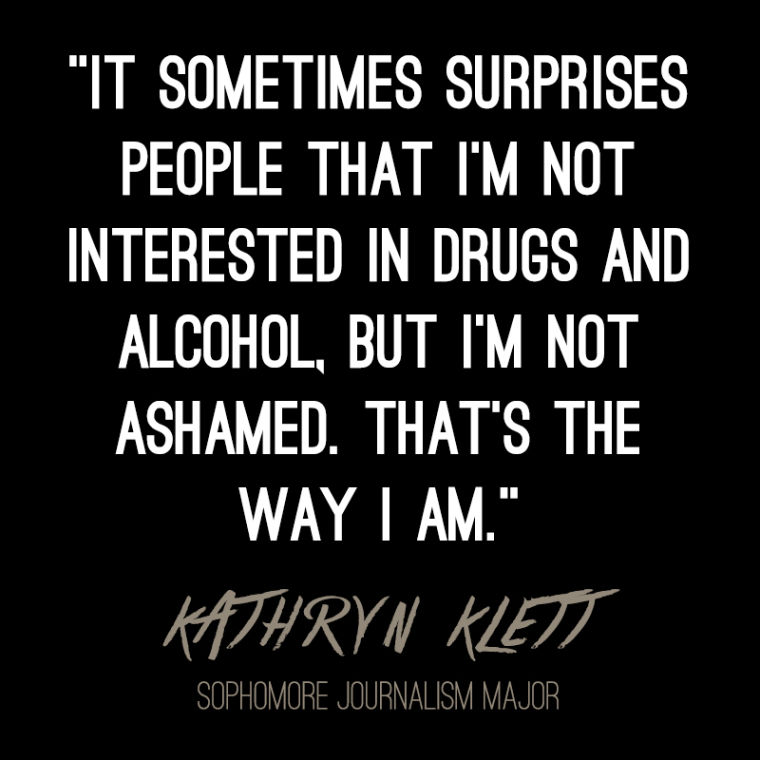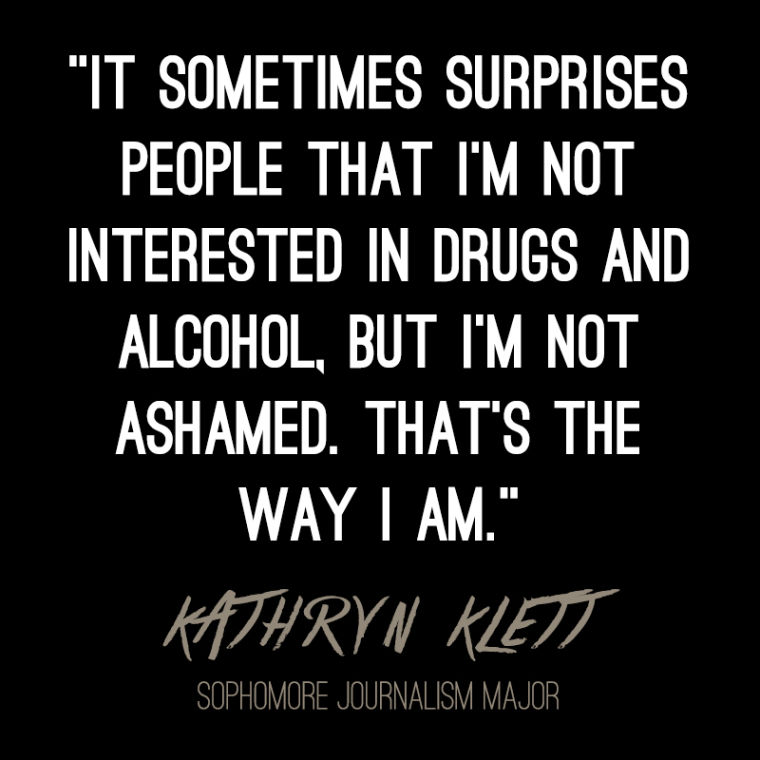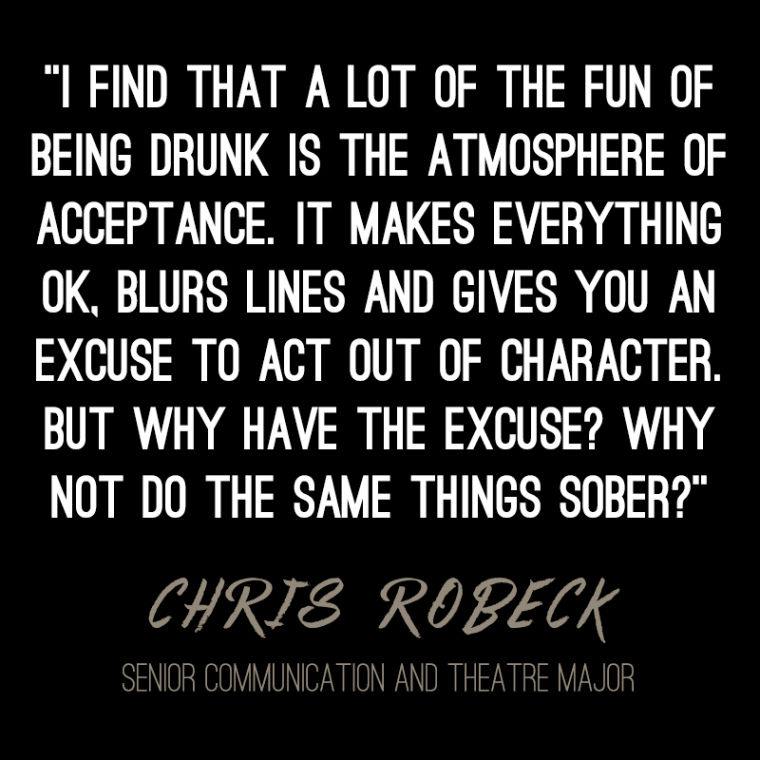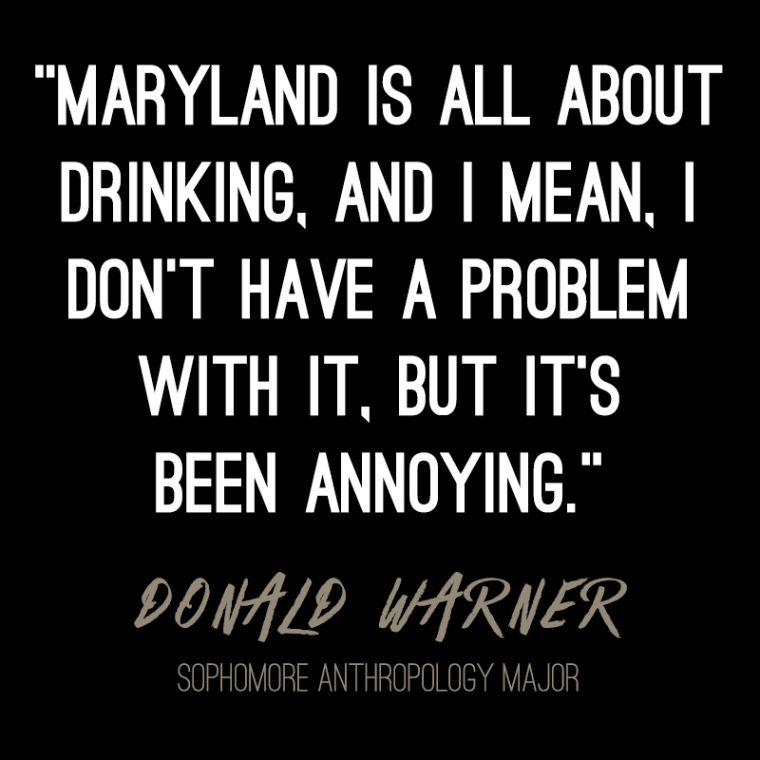On senior Chris Robeck’s 22nd birthday, there were no shots, no slapping the bag and no beer pong.
Instead, the communication and theatre major road-tripped to a national park and snuck in to watch the sunrise, completely sober.
Though stereotypes often depict college as a place where drunk students roam freely at fraternity parties and tailgates, Robeck and some other students at this university have decided it’s an aspect of the college experience they don’t want to partake in.

Chris Robeck, senior communication and theatre major
Click to enlarge
Rather than spending money on drinks at the bar, some will splurge on concert tickets. Others will trade a night of studying the inside of a toilet for an evening studying their books.
For Robeck, the decision not to drink is a private one — and often, rather than giving the real reason, he’ll make up a story at parties.
“It depends on the occasion what story I’ll give them,” Robeck said. “I’ll say I had a bad experience once — there was a cat and a long run. Then I sort of just trail off and let people fill it in for themselves.”
Reactions vary when Robeck refuses alcohol at a party. Some people tell him he should drink, while others nod and move on. Some students respond with admiration, he said, seeming impressed he can make it through college without drinking — a response Robeck said makes him feel sad at times.
“It becomes very clear, I think, that they feel like they have to drink. When they’re so impressed that I’m able to not drink, it seems like they wish they could do it also,” Robeck said. “But the thing is, they don’t have to drink either. Maybe they’re under the impression they have to, or they won’t have friends or whatever else. But that’s not true.”

Kathryn Klett, sophomore journalism major
Click to enlarge
At a university with more than 26,000 undergraduates, there are many options for nondrinkers, said Kathryn Klett, a sophomore journalism major.
“If you try, you’ll run into folks who think the same way you do,” Klett said. “It sometimes surprises people that I’m not interested in drugs and alcohol, but I’m not ashamed. That’s the way I am, and I know what I’m doing will benefit me in the future.”
Klett was a member of Gymkana, the university’s substance-free gymnastics program, last year and remains substance-free this semester. Instead of drinking on weekends, she finds alternate activities, such as attending plays at the Clarice Smith Performing Arts Center, inviting friends over, going on runs, studying or catching up on sleep.
For Robeck, a weekend free of alcohol calls for adventures. Rather than getting drunk and having the excuse to do “stupid, crazy things,” he does them without the excuse and has no regrets.
“I find that a lot of the fun of being drunk is the atmosphere of acceptance. It makes everything OK, blurs lines and gives you an excuse to act out of character,” he said. “But why have the excuse? Why not do the same things sober? You definitely wouldn’t be as good at sneaking into a national park if you were wasted.”
Robeck and Klett have spent their entire time at this university substance-free, entering freshman year with the intention of staying sober. Sophomore anthropology major Donald Warner, on the other hand, has seen both sides.
Freshman year, Warner said, he focused much of his energy on drinking. Realizing this, he decided he would begin his sophomore year by seeing what would happen if he didn’t drink.
“I just wanted a change,” he said. “I was like, ‘Let me try and see if I don’t — what will happen?’ It was sort of like a challenge.”
It’s been an interesting experience, he said. When not working at his on-campus job, he finds time to attend quieter parties or watch movies on the weekends. But the university doesn’t have much of an emphasis on sober activities, he said.

Donald Warner, sophomore anthropology major
Click to enlarge
“That’s the thing that has sucked. Maryland is all about drinking, and, I mean, I don’t have a problem with it, but it’s been annoying,” Warner said. “On AlcoholEDU, they tell you so many people don’t drink, blah blah, but I don’t know that it’s really true.”
Robeck also found that this campus’s culture has a heavy emphasis on drinking.
“It’s much more socially acceptable to drink, I’d say. If you don’t drink, you’re the oddball, but if you do drink, it’s just dropped. It’s not, ‘Why do you drink?’ It’s, ‘Why don’t you?’” Robeck said. “I think it’s hard on a lot of people. You’re sort of an outcast.”
And though he acknowledges the university’s attempts to provide more substance-free events, he said the events don’t have enough widespread appeal. He and his friends have learned to be creative in their activities, but he said others aren’t as lucky. They might not have the resources to be as spontaneous, he said, leaving them with only the options of staying at home or going out and drinking.
“I understand it’s really difficult to plan events that students would be interested in, it’s a hard fight to win,” Robeck said. “It takes weeks of planning for one event that people will be as interested in as going, ‘Hey dudes, come over to my house and bring some beer.’ It’s an uphill battle, but I definitely think the school could use some improvement.”






